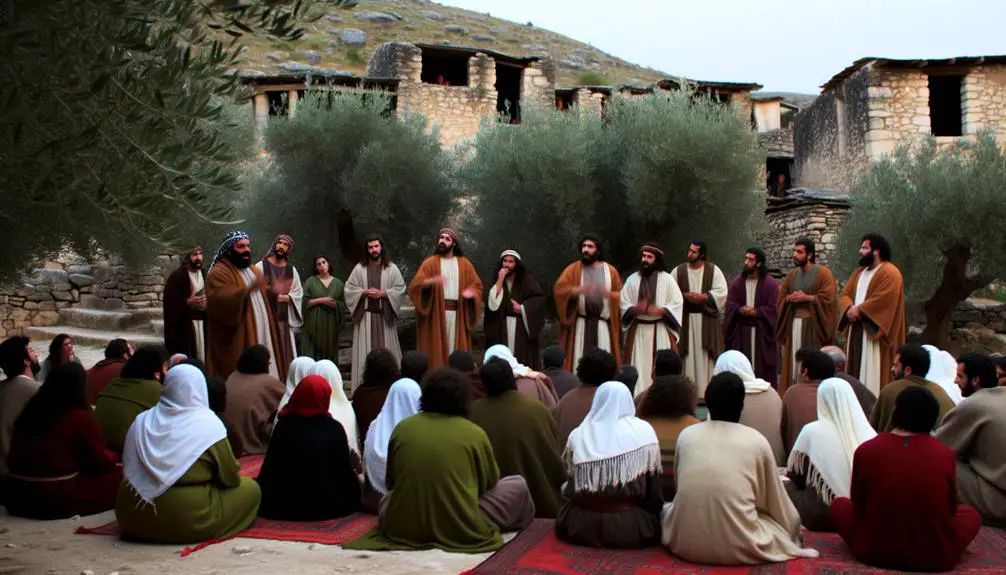Explore how 'Follow Me' in the Bible marks transformative calls to faith and leadership, inviting a deeper dive into spiritual commitments.

Follow Me in the Bible
In the Bible, "Follow Me" is a command that recurrently steers pivotal moments and relationships with the divine. You'll find this phrase signaling a profound invitation to figures like Abraham, who's tasked to leave his homeland and forge a new covenant with God—a promise imbuing his descendants with land and prosperity. Similarly, Jesus uses these words to gather disciples, promising a transformation from fishermen to "fishers of men," exemplifying a spiritual recalibration towards service and evangelism. Understanding these moments illuminates the intricate balance of faith, duty, and leadership threaded through scriptures. Each account enriches the framework of biblical discipleship, urging a deeper exploration of its layers.
Key Takeaways
- "Follow Me" is a recurring command by Jesus in the Gospels, inviting disciples to join His ministry.
- This invitation signifies a call to spiritual commitment and transformation.
- Following Jesus often requires leaving behind one's previous life, as seen with the disciples abandoning their jobs.
- The phrase emphasizes a personal relationship with Jesus, central to Christian discipleship.
- It also implies readiness to face challenges and sacrifices for spiritual growth and spreading the Gospel.
The Call of Abraham

One pivotal moment in biblical narratives is when God calls Abraham, marking a foundational shift in religious history and personal destiny. Located in Genesis 12, this event not only signifies Abraham's profound faith but also delineates a divine strategy that unfolds throughout the scripture. You're drawn into a narrative where Abraham's departure from Haran isn't merely a physical journey; it's a radical act of obedience to God's command. This Haran departure encapsulates a break from the familiar – a leap into a covenantal relationship with God that promises not just land but a lineage.
As you analyze this, it's important to understand that the Promised Land isn't only a geographical entity but a symbolic representation of divine providence and favor. This land, flowing with milk and honey, is not just a physical space but a theological assertion of God's blessing and presence. The promise of this land underscores a future filled with hope and a national identity for Abraham's descendants. This narrative invites you to ponder the implications of faith that moves beyond the visible, challenging you to embrace the unknown, assured by the promise of divine guidance and protection.
Moses and the Exodus
As you explore Moses' leadership during the Exodus, consider the multifaceted challenges he faced, from internal dissent to external threats. The plagues of Egypt, which can be analyzed both as divine interventions and as strategic disruptions, played a critical role in the Hebrews' liberation. Each plague targeted specific Egyptian deities and societal structures, revealing a complex interplay between theology and socio-political dynamics.
Moses' Leadership Challenges
Moses faced numerous leadership challenges during the Exodus, including managing the diverse needs and growing discontent among the Israelites. His leadership style was tested by the relentless desert wanderings, a journey fraught with physical and spiritual hardships. You'll find that Moses had to constantly adapt to both external threats and internal crises. The desert wanderings weren't just a physical challenge but a crucible for leadership. His approach combined direct communication with God and iterative problem-solving with his people, highlighting a form of leadership that was both autocratic and responsive. This duality was essential, as he had to enforce divine directives while also attending to the burgeoning doubts and needs of a fractious community. Each decision Moses made shaped the character and faith of the Israelites, forging a distinct identity for the emerging nation.
Plagues of Egypt
The plagues of Egypt, a series of divine interventions, marked a pivotal episode in the Exodus, demonstrating God's power and escalating the confrontation between Pharaoh and Moses. You'll notice that each plague targeted specific Egyptian beliefs, systematically dismantling the Pharaoh's authority and the gods' perceived potency. The Nile transformation into blood was particularly symbolic; the river was Egypt's lifeblood, essential for irrigation and drinking. Its contamination not only caused ecological disaster but also struck at the heart of Egyptian theology, which revered the Nile as divine.
The locust devastation further exemplified divine judgment, destroying crops and exacerbating the already severe famine conditions. This plague attacked the economic foundation of Egypt, highlighting the vulnerabilities within Pharaoh's domain and intensifying the socio-political pressures he faced.
David's Rise and Reign

As you explore the narrative of David's rise to kingship, you'll notice the profound significance of his anointment, which marks a pivotal shift in biblical leadership dynamics. Throughout his reign, David faced numerous challenges that tested his resolve and wisdom, particularly in political, military, and personal spheres. These trials not only shaped his rule but also profoundly influenced the theological and cultural underpinnings of ancient Israel.
David's Anointment as King
David's anointment as king marks a pivotal shift in biblical history, symbolizing the evolution from tribal confederacy to centralized monarchy. This event, orchestrated by Samuel, not only underscores his significant role as a prophet but also highlights the beginning of Saul's deep-seated jealousy. As you explore further, you'll see that this transformation wasn't merely a change of leadership but a profound metamorphosis in the socio-political landscape of Israel.
- Samuel's Prophetic Leadership: Anointed David despite societal norms.
- Divine Choice: God's selection of David, bypassing Saul.
- Saul's Reaction: Envy and fear towards David's ascent.
- Public Perception: Shift from Saul to David marked by popular support.
- Symbolic Anointment: Olive oil, signifying sanctity and chosen leadership.
This intricate process set the stage for Israel's future under David's rule.
Challenges During Reign
Often, during his reign, David encountered numerous challenges that tested both his leadership and his faith. You'll find that his trials weren't just battles against neighboring kingdoms, but also internal royal disputes that threatened the stability of his court. These disputes often foreshadowed the complexities that would later define Solomon's reign. Indeed, Solomon's wisdom, which was celebrated for its divine origin, can be seen as a necessary response to the intricate court politics and family betrayals David had to navigate. Analyzing these elements, it's clear that the seeds of leadership challenges in Israel's monarchy were sown during David's era. His handling of these issues set precedents for governance and conflict resolution in the biblical narrative of kingship.
Prophets and Their Messages
Throughout history, biblical prophets have conveyed messages that are both transformative and challenging, serving as divine intermediaries to guide and correct humanity. You'll find that their roles are pivotal, yet their experiences and the reception of their messages vary greatly.
Consider Isaiah and Jonah, two prophets who highlight the complexity of prophetic life. Isaiah's visions reveal a deep connection with the divine, offering a glimpse into God's plan for salvation and justice. His messages often centered around the need for repentance and the hope of redemption, emphasizing a future where peace and righteousness prevail. On the other hand, Jonah's reluctance to deliver God's message to Nineveh showcases the human side of prophets—fear, hesitation, and personal struggle are as much a part of their stories as their divine missions.
To explore further, consider these aspects:
- Isaiah's call to prophethood: A profound spiritual encounter that shaped his future messages.
- Jonah's flight: His attempt to escape God's call reflects his internal conflict.
- Impact of messages: How their words influenced their contemporaries.
- Personal challenges: The emotional and spiritual trials they faced.
- Legacy: The lasting influence of their prophetic messages in biblical narrative and beyond.
Analyzing these elements, you'll appreciate the depth and breadth of what it meant to be a prophet in biblical times.
Jesus' Ministry Begins

Moving from the era of prophets like Isaiah and Jonah, we now explore how Jesus' ministry marks a pivotal moment in biblical history. At the outset, the significance of His baptism cannot be overstated. This event, chronicled in the Gospels, symbolizes purification and readiness to begin a divine mission, effectively shifting from the preparatory teachings of John the Baptist to the active ministry of Jesus. It's also a profound act of humility and identification with humanity's plight, setting the stage for His redemptive work.
As you dig deeper into Jesus' ministry, His teachings in Capernaum emerge as significant. This small fishing village on the Sea of Galilee became a focal point for His early ministry. In Capernaum, Jesus didn't just teach; He lived and interacted with the common folk, which underscores the accessibility and immediacy of His message. These teachings, often delivered in the local synagogue, emphasized the coming of God's kingdom, calling individuals to repentance and a transformed life. His words here weren't merely instructive but carried an authoritative weight, challenging traditional interpretations of the law and prophetic texts, and thereby reshaping the spiritual landscape of the time.
Parables and Teachings
In His parables and teachings, Jesus explored simple stories with deep spiritual meanings to communicate profound truths about the kingdom of God and human behavior. These narratives, rich in symbolism and moral teachings, are crucial for you to understand not just the ethos of Christianity, but the broader implications for ethical human conduct. Let's investigate further into two prominent examples: the Parable of the Mustard Seed and the Parable of the Good Samaritan.
- Mustard Seed: This parable illustrates the concept of growth from minuscule beginnings. Just as the tiny mustard seed grows into a large tree, so can a small amount of faith expand to great spiritual maturity. This teaches you about potentiality and the importance of nurturing spiritual 'smallness' into significant impacts.
- Good Samaritan: Emphasizing altruism, this story challenges you to evaluate your actions towards others, irrespective of societal boundaries. It encourages active compassion and kindness, highlighting that neighborly love transcends ethnic and social prejudices.
- Contextual Interpretation: Understanding the cultural and historical context of these parables enriches your comprehension of their lessons and applicability.
- Symbolic Significance: Each element in Jesus' parables holds symbolic meanings, aimed at eliciting deeper reflection on ethical and spiritual issues.
- Personal Application: Reflect on how these teachings can influence your daily interactions and personal growth. These stories aren't just ancient texts, but living words meant to inspire and guide your life choices.
The Crucifixion Event

The Crucifixion of Jesus Christ marks a pivotal event in Christian theology, deeply embodying themes of sacrifice, redemption, and divine love. This Roman execution, not just a mere historical event, represents a theological fulcrum around which much of Christian doctrine pivots. Executed at the Golgotha site, a place also known as the 'Place of the Skull,' the method and location of Jesus' death are fraught with symbolic significance.
Roman crucifixion was a particularly brutal method of public execution, reserved primarily for slaves, revolutionaries, and the most despised criminals. The choice of this mode of death for Jesus highlights the depths of humiliation and suffering he endured. In your understanding of this event, it's important to grasp that beyond the physical agony, the crucifixion was layered with profound spiritual and existential dimensions.
Theologically, the crucifixion is central to the concept of atonement in Christian belief. It's here that you see the manifestation of ultimate sacrifice—Christ's death as a redemptive act for humanity's sins. This event isn't just a moment of intense physical suffering; it's a pivotal point of connection between divine intention and human experience, illustrating the profound depth of God's love for humanity. The crucifixion, therefore, stands as a confirmation to the complex interplay of justice, mercy, and love in Christian theology.
Resurrection and Ascension
After the Crucifixion, Christ's Resurrection and Ascension are not simply miraculous events but crucial affirmations of Christian faith, encapsulating the victory over death and sin. You're encouraged to explore the profound theological implications and historical assertions that these events present.
The story begins with the discovery of the Empty tomb, a silent yet profound confirmation of the Resurrection. This absence of Christ's body was initially met with confusion and fear, yet it signifies the fulfillment of His prophetic words and confirms His divinity. Angelic visitations play a crucial role, as heavenly messengers not only proclaimed Christ's Resurrection to the confused followers but also reinforced the truth of Jesus' words, connecting human and divine realities.
Here are five crucial aspects to ponder:
- Empty tomb: Symbolizes Christ's triumph over death, challenging both Roman and Jewish expectations of finality in death.
- Angelic visitations: Reinforce the supernatural element of the Resurrection, offering divine validation of the event.
- Witnesses: Women first encountered the empty tomb, emphasizing their role in early Christian testimony.
- Transformation of the disciples: Shift from despair to bold proclamation, inspired by witnessing the Resurrected Christ.
- Theological implications: Confirms the Christian doctrine of resurrection for all believers, promising eternal life beyond physical death.
These elements not only validate the historical and spiritual reality of the Resurrection and Ascension but also encourage you to reflect on their significance in your personal faith journey.
Apostles Spread the Word

Empowered by the Holy Spirit, apostles began their mission to spread the transformative message of Christ's Resurrection across diverse regions. The core of their activities revolved around missionary journeys, particularly those undertaken by Paul, whose writings later formed a substantial part of the New Scripture.
As you explore the early Christian texts, you'll notice the strategic approach the apostles adopted to communicate their message. They didn't simply wander; each journey was purposefully directed towards major urban centers of the Roman Empire, where roads and seas could carry their words far and wide.
Paul's writings serve as an important component of these evangelical efforts. His letters to the early churches not only guided their spiritual growth but also addressed specific challenges they faced, weaving theological insights with practical advice.
Here's a brief overview of the apostles' journeys and the impact of Paul's letters:
Region Visited |
Impact of Paul's Writings |
|---|---|
Galatia |
Clarified the nature of faith and works |
Corinth |
Addressed church disputes and moral issues |
Ephesus |
Strengthened doctrinal understanding |
Rome |
Fostered unity and encouragement in suffering |
These efforts highlight the sophisticated network and theologically rich content that defined early Christian missionary activities.
Frequently Asked Questions
How Can Beginners Start Understanding the Bible?
To grasp the Bible as a beginner, you'll find diving into study groups invaluable. There, you'll explore translation differences, deepening your understanding through collective analysis and detailed discussions. It's a scholarly approach to enlightenment.
What Are Some Common Misconceptions About the Bible?
You might believe the Bible should always be taken literally or that it's an infallible text. However, scholarly analysis shows these are misconceptions; interpretations vary, and historical context greatly influences its understanding.
How Is the Bible Relevant to Modern Life?
The Bible bridges ancient wisdom with modern ethical dilemmas, guiding you through contemporary cultural relevance. Its stories offer deep insights into personal and societal challenges, making it a timeless compass in today's world.
Are There Any Scientific Facts Mentioned in the Bible?
Yes, the Bible mentions scientific facts, including cosmological references and aspects of ancient medicine. These elements reflect the understanding of the universe and health during the times when the biblical texts were written.
What Are the Different Genres Found in the Bible?
In the Bible, you'll uncover a mosaic of genres. Historical context and literary analysis reveal poetry, law, prophecy, and narrative. Each genre uniquely contributes to the overarching tapestry of this ancient text.



Sign up